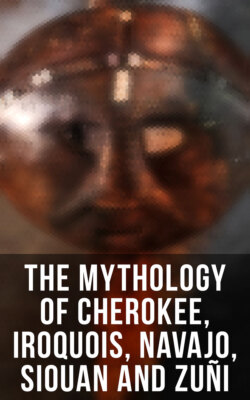Читать книгу The Mythology of Cherokee, Iroquois, Navajo, Siouan and Zuñi - James Mooney - Страница 101
На сайте Литреса книга снята с продажи.
Paradise and the Supernatural People
ОглавлениеThe Red Man appears to have possessed two wholly different conceptions of supernatural life. We find in Indian myth allusions both to a 'Country of the Ghosts' and to a 'Land of the Supernatural People.' The first appears to be the destination of human beings after death, but the second is apparently the dwelling-place of a spiritual race some degrees higher than mankind. Both these regions are within the reach of mortals, and seem to be mere extensions of the terrestrial sphere. Their inhabitants eat, drink, hunt, and amuse themselves in the same manner as earthly folk, and are by no means invulnerable or immortal. The instinctive dread of the supernatural which primitive man possesses is well exemplified in the myths in which he is brought into contact with the denizens of Ghost-land or the Spirit-world. These myths were undoubtedly framed for the same purpose as the old Welsh poem on the harrying of hell, or the story of the journey of the twin brothers to Xibalba in the Central American Popol Vuh. That is to say, the desire was felt for some assurance that man, on entering the spiritual sphere, would only be treading in the footsteps of heroic beings who had preceded him, who had vanquished the forces of death and hell and had stripped them of their terrors.
The mythologies of the North American Indians possess no place of punishment, any more than they possess any deities who are frankly malevolent toward humanity. Should a place of torment be discernible in any Indian mythology at the present day it may unhesitatingly be classed as the product of missionary sophistication. Father Brébeuf, an early French missionary, could only find that the souls of suicides and those killed in war were supposed to dwell apart from the others. "But as to the souls of scoundrels," he adds, "so far from being shut out, they are welcome guests; though for that matter, if it were not so their paradise would be a total desert, as 'Indian' and 'scoundrel' are one and the same."
